Description
Air source heat pumps are a great alternative to traditional heating systems because they allow you to generate your own heat and can help you reduce your energy bills and carbon footprint. But what exactly are they? And why should you choose one?
What is an air source heat pump system?
Air source heat pumps are a low-carbon form of central heating that, when combined with renewable energy, transfer heat from natural elements outside (like the air) into your home. They can absorb heat from outside at temperatures as low as -15 degrees and, with the help of electricity, convert it into usable heat, giving you floor heating or hot radiators.
These appliances work in a similar way to refrigerators, but in the opposite direction, generating heat from the environment. A refrigerator works by drawing heat from the appliance, which lowers the temperature. An air source heat pump, on the other hand, uses the outside heat, bringing it into your home.
To make this process happen, a fan is used to draw air into a heat exchanger (or evaporator). The heat from the air is transferred to the refrigerant circulating in the evaporator, causing it to change from a liquid to a vapor. The compressor then uses electricity to compress the vapor, causing it to rise in temperature. At this high temperature, the heat is suitable for transfer to your home's heating and hot water systems.
Air source heat pumps have an outdoor unit that is mounted outside your home, and the size you need depends on the size of your home, the number of people who live there, and your heating and hot water needs.
Why choose an air source heat pump?
Due to the efficient design and efficiency of the system, these solutions can generate heat even when the outdoor temperature is as low as -15°C. This dispels the myth that heat pumps are only effective in warmer climates, as they can continue to collect heat even when the temperature drops at night.
Not only can air source heat pumps provide heat during the colder months, they can also act as a cooling system in the summer. With an air source heat pump cooling system, you benefit from a versatile solution that can help you enjoy comfort at home all year round, not just in the winter.
In addition, air source heat pumps are easier to install than ground source heat pumps, especially when retrofitting, so if you're worried that the installation work will be a hassle, don't be. They also require no fuel transportation and storage, require minimal maintenance, and have a long service life.
Advantages of air source heat pumps
1. Free heat source available at any time of the day
2. Relatively low investment cost
3. Scalable through cascading function
4. No official approval required
5. Suitable for new build and modernisation projects
6. Retrofittable
7. Environmentally friendly
Can you get a grant for air source heat pumps
The Boiler Upgrade Scheme is a £450 million government grant to help households decarbonise. This will provide a real financial incentive for homeowners seeking to install the latest renewable energy technologies covered by the scheme.
Air source heat pump product range
Leomon 360-A
* Air source heat pump
* Rated heating output: 2.1 to 14.9 kW
* High energy efficiency
* Sustainable operation
* Cooling function
Leomon 365-A
* Air source heat pump
* Rated heating output: 2.1 to 14.9 kW
* Integrated domestic hot water cylinder
* High energy efficiency
* Sustainable operation
* All-in-one design
Leomon 380-A
* Air source heat pump
* Rated heating output: 4.0 to 12.0 kW
* Separate indoor and outdoor units
* Highest efficiency in the smallest space
* Ideal for use in densely built areas
Extremely quiet operation
Our heat pumps feature an advanced acoustic design, which means that all components of the heat pump are carefully designed to minimize noise.
Design and technology
In the all-in-one version, all components that are critical for heat recovery are located inside the heat pump. The connecting pipes between the indoor and outdoor units are simply filled with water, which means that such devices can be put into operation quickly and easily.
Depending on the purpose, air source heat pumps can be used in a variety of ways. The Leomon 360-A and Leomon 365-A air source heat pumps are particularly suitable for modernization projects, while the Leomon 380-A air-to-water heat pump is more suitable for new construction projects. Compared with brine heat pumps, air-to-water systems require lower investments. This is because the drilling work required to install geothermal collectors or geothermal detectors is completely unnecessary.
The heat pumps are designed for both indoor and outdoor use, and outdoor installation is particularly space-saving. Only the control system and hydraulic components are installed on the wall of the house.
Contact us
If you are still hesitating about whether to buy an air source heat pump, please contact us. Our heat pump experts will give you the best advice.






